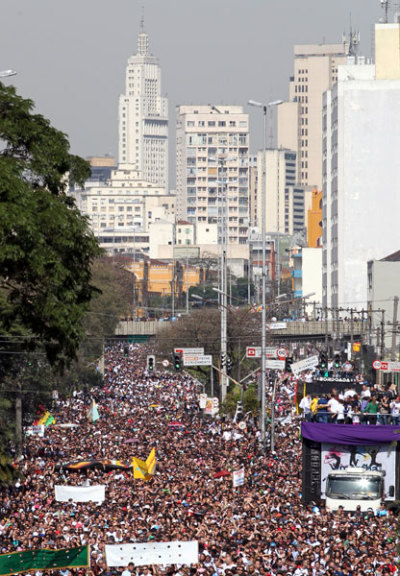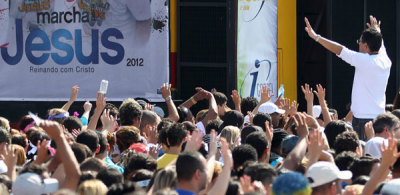2 Million Brazilian Evangelicals Shut Down Sao Paulo During 'March For Jesus' Event
Two million Christians from all over Brazil trekked the streets of Sao Paulo over the weekend to join in on the country's largest religious gathering, "March for Jesus." The annual event, organized by Pastor Estevam Hernandes of Renascer em Cristo, or Reborn in Christ Church, and other Pentecostal churches, included speeches and prayers from pastors, political figures, and entertainment from various Brazilian gospel artists.


"After so many years, the event continues to have an impact," Pastor Estevam Hernandes told Brazilian press outlets, adding that the success of the event was due to years of "work and prayer."
This year's theme was "New Time," which describes the nation's hope for change as it faces its worst social turmoil in over 20 years. During the past two weeks, millions of Brazilians have taken to the streets to demand the government find solutions to provides citizens with better quality of life. Protests that were initially started by students, sparked by a rise in bus fares, has now widened in scope to include professionals, the middle class, and residents of the favelas, or slums, all joining in to voice their dissatisfaction over larger social and political concerns.
Primary concerns ranging from government corruption to the substandard state of public services, particularly health, education and lack of security within communities. In addition, the costs of hosting the 2014 World Cup and the Olympics are part of the myriad of key issues.
These social concerns were evident to Angela Chavez, a missionary who recently returned from a mission trip in Brazil. Chavez says she saw the country's condition before she even flew there through a revelation in a dream.
"I saw new churches begin to open and people being healed of diseases. In my dream, I kept walking around a town and was able to see its financial advancement," says Chavez. "In the Church of Ibitinga (a municipality in the state of Sao Paulo), I saw a big box of pencils, then I heard a voice say, 'there will be a release of divine revelation among leaders and among young people,'" she added.
Once she landed in Brazil, she was able to witness and confirm the reasons why Brazilians have taken a united stance against their government.
Amid the country's tense social condition, "March for Jesus" organizers say their event is peaceful with the sole purpose of gathering evangelicals to publicly express their faith.
One of the millions on hand to support the event was Marco Feliciano, a controversial pastor and Brazilian lawmaker. Feliciano, who currently faces demand for his resignation as president of the human rights commission over controversial comments he made about race and homosexuality, is also under investigation for alleged embezzlement within his Pentecostal church.
The "March for Jesus" event, considered to be the largest of its kind in the world, according to organizers, continues to grow each year in the predominately Roman Catholic country. "March for Jesus" almost doubled in size this year compared to 2012, and is also known to draw larger crowds than some of Brazil's popular carnivals, including Sao Paulo's Gay Pride Parade and the Salvador Carnival celebration.




























